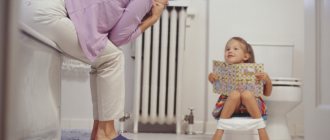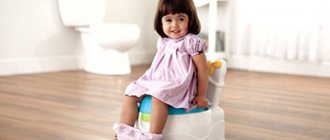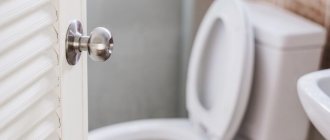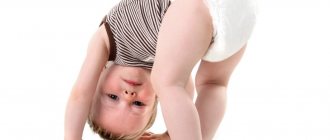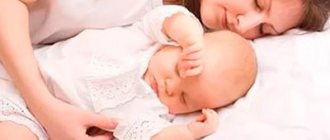Although, of course, there are good doctors in clinics. The fact is that this is my husband's child. All my requests to his mother to go to the doctor were unsuccessful. And then she began to wake him up at night, first at 1-2 o’clock in the morning, then at 5 o’clock in the morning. And so every night. It's very hard. We know how to treat enuresis in Saratov and how to cure enuresis in Russia. You need to go to a neurologist, preferably not to a free clinic, where if you are unlucky they may say that it is either not necessary to be treated at all, or they will treat it there and it would be better not to start.
Don't panic. Waking your child to go to the bathroom again will interrupt his sleep and cause him to have trouble sleeping. You should not wake your child unless absolutely necessary. Because children usually stop wetting the bed as they age, most pediatricians do not recommend any medications. However, there are drugs that can achieve quick results.
Causes of nocturnal enuresis in adult women
Bedwetting in women is a fairly common ailment. In this case, the volumes of fluid released can be measured by drops or by emptying the entire volume of the bladder. Common causes of enuresis during sleep in adult women:
- Overactive bladder , in which damaged nerves send signals to the organ at inappropriate times.
- Diseases that limit the normal physical activity of a woman. These include wheelchair-related disabilities, Alzheimer's disease, strokes, multiple sclerosis, Parkinson's disease or arthritis in old age.
- Bladder fullness. If the organ does not empty properly, fluid leakage will occur constantly. This problem may appear due to weakening of the bladder muscles, blockage of the duct, urolithiasis, tumor or nerve damage due to diabetes.
- Long-term constipation. Incontinence in this case will be temporary and will exist until the intestines are emptied.
- Urinary tract infections.
It is necessary to take care of your health, avoid infections and hypothermia
- Taking certain medications. Incontinence appears as a side effect of diuretics and ends after their use is stopped.
- Frequent consumption of caffeinated drinks. You are allowed to consume no more than 2 cups of the product per day. Caffeine is a diuretic and can further cause incontinence.
- Gestational period (pregnancy). A delicate problem may disappear after childbirth, or develop into a permanent one due to weakening of the pelvic floor muscles.
- A state of stress or mental overstrain.
- Menopause. Urinary incontinence in this case is a symptom of the approaching menopause.
- About the structural features of the organs of the urinary system, including congenital defects. This problem can only be treated surgically.
The frequency of urination for the “fair sex” should normally not exceed 7 times a day. More frequent urges to go to the toilet, including at night, should be a reason to visit a doctor. The causes and treatment of enuresis in adult women are determined by the doctor.
QUESTION: Hello! I'm 12 years old and I pee at night. It so happened that I was sent to a children’s shelter, I didn’t say anything about it there and peed myself 4 nights in a row and no one noticed, and today the nurse, Aunt Sveta, asked me why you stink of sanitation, took me to the bedroom, took off my blanket , he says, oh, you’ve peed yourself all over, and more than once, the nanny changed the bed, she said if you still poop in bed, you’ll sleep in the toilet, now I’m afraid, because I know I’ll wet myself at night, what should I do? Kolya
ANSWER:
Good afternoon Kolya. The problem you write about is quite common among boys at your age. It can be dealt with. Many people who are very successful as adults peed at night as children. But it is important to know: have you always had this problem or does it appear in connection with some events? In the first case, solving the problem may take more time and effort, in the second case, less. But you will have to work hard. I will suggest several exercises that you can do regularly. The more conscientious you are about exercise, the faster you will cope with your problem. Option 1. If the problem has always been there, most likely - your bladder does not know how to stretch and hold a large amount of urine, - your brain does not hear the call signs of the bladder during your sleep. Exercises. 1. To stretch the bladder, hold urine for as long as possible after the first urge to urinate. - Just as the bladder wants to be freed from urine, it sends a signal to the brain to tell you that it is time to go to the toilet. The next time this happens, instead of immediately running to the toilet, see if you can wait a little longer. Be patient as long as possible. If you do this consistently, you will train the bladder to hold urine longer and longer and, in addition, you will learn to stretch it so that it can hold more urine. Therefore, this must be done at least once a day and it is better if there is a toilet nearby. To take your mind off your bladder at this time, you need to focus on something else. This way your bladder will be able to hold urine all night without bothering you. 2. To strengthen the bladder muscles and make them manageable. Every time you urinate, you need to interrupt the stream of urine ten times and release it again. This does not need to be done only when you go to the toilet for the last time before going to bed. Then you just need to let all the urine come out. 3. In order for the bladder and brain to learn to communicate better at night, it would be good to use your imagination. For example, imagine that your bladder calls your brain on the phone and does not whisper into the receiver, as it usually does, so as not to disturb the brain at night, but yells at it so that it wakes up. Perhaps your brain switches its phone to silent mode at night, so as not to disturb your sleep. Convince him to turn on at least the vibration mode at night so that he hears the signal from the bladder. And explain that you must be woken up in time so that you have time to get to the toilet. This exercise is good to do when you are relaxed. More on this in the next exercise. 4. Relaxation exercise. Imagine that you are turning into a rag doll. Start with your left hand. She becomes lethargic and relaxed. Then move on to the entire arm and so on until you have covered the entire body. When all the muscles become relaxed, imagine something pleasant, fantasize. If this problem occurs periodically due to stressful situations, follow exercises 3 and 4. General recommendations. - In the evening and at night, do not eat chocolate and do not drink drinks that contain caffeine: coffee, tea, Coca-Cola, cocoa. They irritate the bladder. You will succeed!
With best wishes, Filyakova Elena Gennadievna.
Tags: teenager 12 years old enuresis teenage wets the bed
Enuresis in men at night: causes
Cases of nocturnal enuresis in men, as in women, can be isolated or permanent. The first ones appear in the background:
- constipation;
- inflammatory diseases of the urinary system (cystitis, urethritis);
- urolithiasis;
- acute respiratory infections;
- diabetes, in which nervous regulation is disrupted;
- taking diuretics or calcium channel blockers.
Even isolated cases of enuresis should prompt a visit to the doctor. Timely treatment will prevent this problem from developing into a chronic form.
Chronic enuresis can also develop in men
The causes of persistent enuresis during sleep in adult men may be as follows:
- pathologies of the central or peripheral nervous system (spinal injuries, Alzheimer's disease, cerebral stroke, tumor neoplasms, intervertebral hernias, epilepsy, multiple sclerosis);
- psychosomatics;
- chronic diseases of the urinary system;
- benign neoplasms (prostate adenoma);
- prostate cancer;
- post-traumatic state;
- relaxation of the pelvic floor muscles as a result of surgical treatment.
With timely consultation with a doctor, bedwetting in adults can be cured quite quickly.
Why does incontinence occur after drinking alcohol at night?
Doctors do not consider alcoholic enuresis as an independent disease. It is a syndrome that appears against the background of alcohol consumption. After drinking alcohol, spontaneous emptying of the bladder occurs for a number of reasons:
- intoxication as a result of the influence of toxic substances on the peripheral nervous system;
- overload of the organ with volumes of fluid consumed;
- depression of consciousness, during which sleep becomes deeper and the person simply cannot control the urge to urinate;
- age in combination with alcohol intake increases the risk of nocturnal enuresis.
Beer, ale, and herbal tinctures have the most powerful diuretic effect. And the combination of several alcoholic drinks at once increases the load on the kidneys and the likelihood of incontinence increases significantly.
Types and symptoms of enuresis
Enuresis in adults can be nocturnal, daytime or mixed. It is also divided into subtypes depending on the reasons that provoked it. Incontinence may be:
- urgent (frequent and strong urge);
- stressful (during laughing, coughing or crying);
- resulting from an overfilled bladder.
Urinary incontinence is not just for children
Nighttime incontinence is a sign of an immature bladder development. According to statistics, 15% of children over 3 years of age and 10% over 5 years of age experience enuresis. Among adults, this problem is more likely a symptom of another disease.
Nocturnal enuresis comes in two forms:
The primary form includes enuresis, in which the patient did not experience a period of dry nights. If in the anamnesis there is a time period of no more than six months during which bedwetting was not observed, then this type of disease is called secondary.
Symptoms of enuresis characterize the cause of its occurrence. The problem can be identified by the following signs:
- an irresistible sudden urge to empty the bladder;
- increased frequency of going to the toilet (more than 8 times a day);
- inability to control the urge to urinate.
Treatment of enuresis in adults at home
Therapy for bedwetting is complex. In addition to medications and the use of diapers at night, the doctor can give the patient recommendations for visiting other specialists or changing lifestyle.
Correction of regime and lifestyle
Sometimes it is possible to get rid of the problem of nocturnal enuresis immediately after changing the patient’s lifestyle and adjusting the patient’s daily routine. Therefore, if incontinence is temporary, the doctor makes the following recommendations:
- limit fluid intake;
- eliminate caffeine and alcohol from the diet;
- visit the toilet on a schedule (every 1-2 hours);
- empty your bladder before bed;
- Use diapers and absorbent diapers at night.
In situations involving stress in the patient, following these recommendations is often enough to combat incontinence.
Bladder training
The pelvic muscles, which contract when a brain impulse arrives, are responsible for timely urination. If the connection between organs is disrupted, daytime or nighttime enuresis begins. To strengthen the fibers, you should do Kegel exercises. Their essence is very simple: the muscles alternately tense and relax, holding at each stage for 3 seconds. You need to perform the exercises 3-4 times a day for 10 approaches.
Bladder training is contraindicated for people who have recently had abdominal surgery, have heart disease, suffer from pelvic organ prolapse, or have a urinary tract infection.
Before treating incontinence at home, consult your doctor.
Medicines and tablets for enuresis
It is unacceptable to treat enuresis on your own with medications. Depending on the cause of the disease, the doctor may prescribe the following to the patient:
- Ovestin;
- Driptan;
- Minirin;
- Duloxetine;
- Picamlon;
- Melipramine;
- Desmporessin;
- Imipramine;
- Desipramine;
- Amitriptyline;
- Oxybutynin;
- Pantogam;
- Pantocalcime;
- Spasmex;
- Vesicare;
- Toviaz;
- Mirabegron.
Some of the listed tablets and suppositories are quite expensive.
You can ask your doctor about existing inexpensive analogues of these drugs.
Physiotherapy
Physiotherapy is a method of treating enuresis in hyper- or hypo-reflexive bladder. Based on the nature of the problem, the doctor may schedule the patient to visit:
- electrophoresis;
- ultrasound;
- diadynamic therapy;
- paraffin applications.
Physiotherapy, as a method of treating enuresis, is usually combined with Kegel exercises. But both methods will be ineffective in case of serious disturbances in the functioning of the urinary system.
Neuromodulation
A neuromodulator is a device inserted under the skin that regulates the functioning of nerve fibers. With this treatment method, muscle tone and urinary control mechanism are restored very quickly.
The operation of introducing a neuromodulator is carried out in two stages:
- Test stimulation. If the indicators are positive during this stage, they move on to the second.
- Device implantation. The guided device easily takes root, functions for a long time and begins to work almost immediately.
Like any surgical intervention, neuromodulation has a number of contraindications. It is prohibited for diseases of the cardiovascular system, malignant neoplasms or inflammatory processes.
Biofeedback (BFB)
The principle of this modern technique lies in the fact that, under the guidance of a doctor, the patient trains individual muscles. For biofeedback technology, computer installations and sensors of vaginal or rectal types are used. They analyze the condition of the muscles and display the results on the monitor.
Modern hygiene products can help avoid some of the awkward moments of incontinence.
The duration of this procedure is on average 45 minutes, and its course includes up to 15 daily visits. For serious causes of enuresis, biofeedback is carried out up to 3 times a year.
Surgical intervention
Surgeries to restore physiological and biological urinary continence can be different, depending on the causes of the problem. After a complete examination, the doctor may prescribe the following to the patient:
- “suspension” of muscles;
- vaginal plastic surgery;
- injections with substances that maintain volume;
- implantation of an artificial sphincter.
In the most extreme cases of enuresis, the patient is prescribed catheterization. A tube is inserted into the urinary canal, the liquid from which flows directly into the container. It will be almost impossible to restore muscles after it. Wearing absorbent panties also becomes an integral part of this type of therapy.
Catheterization is considered the most extreme measure for treating urinary incontinence.
Diet
To combat incontinence, you will have to exclude some foods from your diet. These include:
- citruses and oranges;
- dairy products;
- soda and drinks with questionable composition;
- cookies and sweets;
- caffeine;
- alcohol;
- buns and cakes.
The patient's diet should be correct and balanced. It includes fruits, vegetables and meat in moderation. The liquid will have to be consumed in small sips throughout the day and 1-2 hours before bedtime.
Folk remedies
Folk remedies are considered the safest and most readily available in the treatment of nocturnal enuresis. At home, you can prepare the following popular medications according to reviews:
- Sage tea. To do this, pour 40g of dry raw material into 1 liter of boiling water and leave to infuse for 2 hours. Drink the strained infusion three times a day.
- Dill remedy. To prepare it, you need to pour 1 tablespoon of the plant seeds with a glass of boiling water, then cover the container and leave for 3 hours. The infusion is filtered and drunk daily until the desired result is achieved.
How to stop a child from peeing at night?
Every child goes through a period of wet sheets. It is accepted as the norm that by the age of three, maximum four years, the body already knows how to control this process and the child wakes up to go to the potty. But what to do if wet sheets appear again when the baby has already learned to sleep without “accidents”? How to stop a child from peeing in bed at night?
What can you do to teach your child not to pee in bed at night?
If you still decide to teach your baby to sleep without a diaper, then pay attention to the following recommendations:
- Incontinence will be common at first, and therefore, in order not to spoil the furniture, it is worth purchasing a waterproof mattress cover.
- Always keep a change of clothes for your baby and a set of bedding on hand so that you can change the crib at night and change your baby into dry clothes.
Baby peeing - Get your child used to going to the toilet before bed.
- In the evening, limit the amount of liquid you drink.
- Monitor your child's diet. Spicy and sour foods are irritants to the bladder.
- Make sure there is enough magnesium and potassium in the food your baby eats.
- Keep track of what time your child urinates at night and wake him up a little earlier than this time.
- Buy a night light for your children's room, as children are often afraid to walk in the dark.
- Place a potty in your child's room, even if he goes to the toilet during the day, at night he may be too lazy to travel around the apartment.
- Make sure your baby doesn't freeze at night.
Enuresis in a child
To wean a child from peeing in bed at night is not an entirely simple task, but it can be solved. All that is required from parents is maximum patience and lack of laziness. If the mother is lazy to wake the child up at night to go to the toilet, and follows the rest of the above recommendations, then the process will be very long. The main thing is not to scold the child or get angry with him. You should not focus on failures; it is better to once again praise your child for his achievements.
Alarm bells
The problem of uncontrolled night urination can have two roots: physiological and psychological. The first includes various diseases. Here you cannot do without the help of doctors: you need to undergo the necessary examinations, and then a course of treatment. The psychological aspect is associated with a malfunction of the nervous system. It can be caused by many reasons, so it is important to identify and eliminate the specific source of the problem. Often it is impossible to do without a qualified child psychologist.
When should parents be wary? There are several cases when wetting the bed is not the norm:
- by the age of 4, the baby continues to “pour” in his pants even during the day (4–5 years is the extreme age limit when children stop wetting the bed during sleep);
- if the child slept “dry” for a long time, and then began to wet the sheet (we are talking about systematic incontinence, and not about rare “flaws” caused by the child being overexcited or drinking a large amount of liquid at night);
- if even after 7 years the child continues to pee at night.
In all these cases, there is definitely something to worry about. It is imperative to show the child to specialists. This could be a pediatrician, urologist, neurologist, endocrinologist, psychologist, psychiatrist - it all depends on the situation.
If your child has any concomitant symptoms (we will discuss them later), contact your doctor. If you do not notice any visible symptoms, go to a psychologist first. Perhaps the baby has experienced psychological trauma, severe stress or fear.
When does a child stop writing at night?
First of all, you need to decide at what age it is normal for a child to urinate at night, and when to start sounding the alarm.
A visit to a pediatrician and an examination is required in the following situations:
- When a four-year-old baby regularly pees in his pants, even if he is not sleeping.
- Bedwetting in a seven-year-old child.
- Recurrence of the problem after waking up dry for a long time and using the potty properly.
- When does a 5 year old child pee often?
When to be alarmed?
If the pediatrician does not detect physiological health problems, you should contact a child psychologist. Perhaps the reason for the regression was some kind of emotional stress that the baby had to endure.
Most modern pediatricians recommend not to rush things. If no health problems have been identified in a three-year-old child, but he continues to wet his crib at night, you just need to continue wearing diapers at night until the problem goes away on its own.
The main thing is to never scold or shame your child for wet sheets. On the contrary, this situation requires the maximum amount of love and support.
Physiological causes of enuresis
Actually, the disease itself can be primary and secondary. Primary enuresis is expressed in the fact that the baby does not control his urges either at one year, or at 3, or at 5 years. Secondary is detected in children 5–10 years old who have promptly stopped peeing at night and have not done so for a long time. And then suddenly they “got back to their old ways” again.
The reasons for this, as already mentioned, may lie both in the physical state of the baby and in the mental state.
Physiological enuresis can be provoked by:
- Diseases and pathologies of the urinary system (pyelonephritis, cystitis, etc.). The main symptoms of this are frequent (often painful) but scanty urination, a constant feeling of an unemptied bladder. Possible turbidity of urine, bleeding along with it, increased temperature (in acute form or exacerbation).
- Epilepsy. Involuntary urination in a dream occurs in a baby during convulsive attacks, which he himself may not be aware of.
- Diabetes. The child pees often because he is constantly thirsty and, accordingly, drinks a lot. Therefore, the brain simply does not have time to send a signal about the need to urinate.
In all these cases, timely qualified medical assistance from specialists is necessary. A thorough examination will be required to make an accurate diagnosis and prescribe therapy (sometimes quite long).
It’s not worth emphasizing that the boy is sick and wets the bed—nobody likes to hear that.
It is also necessary to contact a psychotherapist to solve the psychological part of the problem. Hi all. I am 15 years old and I urinate on myself at night. Mom says to wear diapers. In the linen closet, along with the panties, there is a pack of diapers. I can advise you: 1) try not to get tired during the day, don’t overexert yourself, don’t get nervous, don’t freeze (in cold weather you need to dress warmly, and especially your feet should always be warm).
Maybe several times a night. And he doesn't even wake up. If a child's psyche is overloaded and he is overtired, then at night he sleeps too deeply and is unable to wake up. Do not punish your child under any circumstances. At the same time, it is very important to help the child and consolidate the initial successes by reducing the likelihood of urinating during sleep (also called nocturnal enuresis) in the future. The result is from the very first night. There were no side effects, and they were not stated in the description (just minor things).
More interesting:
Her Majesty's psyche
This is the most fragile area of our life. And especially for children. The mental state has a direct impact on general, mental, and speech development. It is quite easy to disturb psychological balance at a young age. And then the nervous system fails (the child may begin to stutter, suffer from insomnia, suffer from nightmares, nervous tics, or pee in bed).
What can cause a failure?
- Great fright. The kid could be scared of anything: a sharp sound (vacuum cleaner, thunder), some animal, heights on a carousel, a bloody scene in a movie, someone’s threats, even parental admonitions about a woman who takes in naughty children. Fear can be caused by a fall and injury, an insect bite, getting stuck in an elevator, a fire, etc.
- Constant family scandals. The screams of adults, even those not addressed to the child, cause strong fear in him, which gradually becomes fixed on a subconscious level.
- Psychological pressure from adults. If strict demands are constantly placed on the baby (especially those that he cannot fulfill), the nervous system turns on a defensive reaction.
- An overabundance of emotions and impressions. Constant stay in crowded, noisy places, endless entertainment events, frequent changes of environment (moving, traveling) cause persistent stress in the child.
- Jealousy of the younger ones in the family. The child subconsciously wants to look just as small and defenseless in order to attract the attention and care of his parents.
How can you wean it off?
How to stop a child from peeing in bed at night? First of all, don't rush things. If at 3 years old a child does not yet control nighttime urination, there is no need to compare him with more conscientious children, much less give them as an example to the child, reproaching him for laziness or disobedience.
You cannot scold the baby, threaten parental sanctions, punish, or shame for a wet sheet. This will only strengthen the child’s feelings of guilt, uselessness, and inferiority. This means that psychological tension will only increase, which will aggravate the problem. It is important to treat it with understanding: the child himself is having a hard time right now, he needs parental support.
What should you do to teach your child to go to the toilet at night?
- Wake up the child shortly before the “X-hour” and sit him down on the potty if urination occurs at approximately the same time (which can simply be determined by observation).
- Keep a change of underwear and pajamas ready every night to replace them when things happen.
- Protect the mattress with oilcloth placed under the sheet.
- Be sure to teach your baby to pee in a potty or toilet before going to bed for the night (the introduction and observance of so-called bedtime rituals helps here).
- Monitor the amount of liquid your child consumes in the evening (this is easier to achieve if you give him plain water when he is thirsty, rather than tasty drinks).
- Eliminate spicy and sour foods that irritate the bladder from your diet.
- Enrich your diet with foods high in potassium and magnesium (bananas, fish, apricots, broccoli) - a lack of these elements can also cause enuresis.
- If your baby is afraid to go to the toilet in the dark, leave a night light and a potty in his room.
- Make sure your child doesn't get cold at night.
- Pay attention and praise him every time he wakes up dry, ignore “emergency” nights.
The main thing when weaning a child from writing at night is understanding, support from parents, showing him your love and care. And, of course, patience. It will take quite a long time for the situation to level out against the background of medical or psychological therapy. A small body needs strength and time to recover from illness or psychological trauma. Moreover, in the second case this is especially important.
First: calm down yourself, and under no circumstances get irritated
Children's sleep control develops differently, and some overcome bedwetting earlier than their peers. Make sure your child drinks less in the evening. Do not give your child drinks containing caffeine.
In addition to caffeine, foods that irritate the bladder, that is, promote urination, should be excluded from the child’s evening diet. Encourage your child to visit the restroom regularly. Free your child from constipation. If you find that your child is constipated, try putting him on a high-fiber diet for a few days.
There are many surefire ways to help a constipated child. Visit the pediatrician with your child. In some rare cases, nocturnal enuresis may indicate more serious health problems.
This device helps develop the habit of waking up on time not only in children, but also in adolescents and adults. Imipramine, which has proven effective in about 40 percent of cases. Keep a vigil near his bed or sleep next to him. When the child wets the laundry, he will move from the wet place or even try to leave the bed. Enuresis can be neurotic in nature (under the influence of stress or as a result of psychological trauma.
How to stop your child from peeing in bed in 7 days: 19 simple steps
Even if the baby disciplines himself to go to the toilet at the right time during the day, this does not guarantee a restful sleep in a dry bed. About 15% of children aged five are still unable to regulate nighttime urination. Sometimes incontinence also occurs in older children. British Alicia Eaton, a clinical hypnotherapist, told how to get rid of bedwetting in a week.
Choose the right moment for training
This should be a week in which the child does not have additional stress, important assignments or important performances in clubs and sections.
Keep a diary
It will help you find out the baby's behavior patterns. Every morning, write down how many times the child woke up wet, at what time this happened and on what day of the week, whether the previous day was difficult for the child, or perhaps, on the contrary, the next day was marked by an important event. It is necessary to record what the baby ate and drank the day before, whether any unusual events took place, for example, a friend’s birthday, or playing sports.
Clear a path to the toilet or potty
It is more difficult to navigate when you are awake, so make sure that it is easy for your baby to get to the right place.
Think about lighting
According to Alicia, many kids admit that they are afraid to go to the toilet at night because it is dark in the hallway. Make sure you have a night light, and if your baby is still scared, place the potty next to the bed.
Arrange the space
The toilet or bathroom, if the bathroom is combined, should be as comfortable as possible for the baby. Letting the towel and paper hang at the right height will help your child feel like the space is theirs.
Taking your baby to the toilet twice
Let him go to the toilet or potty twice before bed before he finally settles down.
Don't set your child up for negativity
You should not tell your child that he will wake up wet again or that he does not feel when he needs to go to the toilet.
Don't talk about your experience
Some fathers and mothers, wanting to console their children, say that they themselves have encountered a similar situation. But according to Alicia, this is a kind of “self-fulfilling prophecy” that sets the child up for failure.
Preventing nocturnal enuresis in children
Both caffeine and alcohol have a diuretic effect, meaning they increase urine production in the body. This operation involves increasing the capacity of the bladder by cutting it and connecting it to a section of the intestine. If you are trying to stop your child from wetting the bed, note the time of nighttime enuresis (this will help in the future if any disease is detected).
7) at night the room where you sleep should be warm, and it is better to sleep in woolen socks. When you go to bed, set an alarm clock so that in about an hour and a half to two hours you wake up and go to the toilet. Normally there are 2 options. The first option: the child (boy, girl) sleeps until the morning, and in the morning goes to the potty (or to the toilet, or to the toilet) and pees. In this case, the boy or girl’s mechanisms of nervous regulation of the act of urination are disrupted, and serious complex treatment is needed.
When you go to bed, set an alarm clock so that in about an hour and a half to two hours you wake up and go to the toilet. Normally there are 2 options. The first option: the child (boy, girl) sleeps until the morning, and in the morning goes to the potty (or to the toilet, or to the toilet) and pees. In this case, the boy or girl’s mechanisms of nervous regulation of the act of urination are disrupted, and serious complex treatment is needed.
The effectiveness of enuresis treatment at Sarklinik is high. BUT you may not be lucky!!! I didn’t get enough sleep at all, and I don’t have a husband. Now my son is 4 years old and he hardly pees. And if his chart does not indicate that he has had enuresis since childhood, then he will not be considered one.
And the whole family (including the grandparents, they think it will pass, or they groan) But there is no action. In our case, the reason was the father of these children. It’s hereditary in their family; all the boys were boys and didn’t serve in the army.
